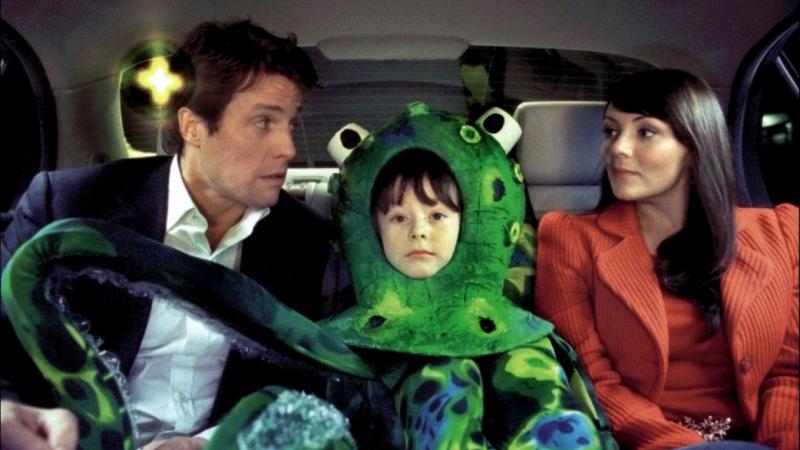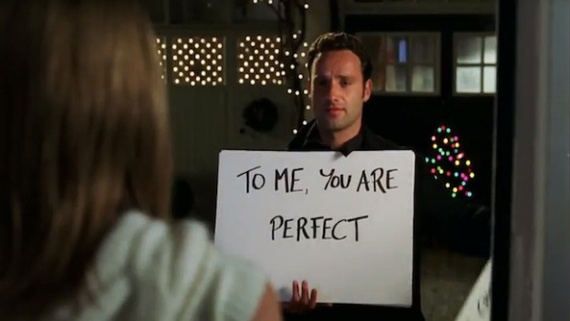In this interim period between the day where we give each other presents and eat all the food, and the night where we drink all the alcohol and frantically look for someone to kiss at midnight or be destined for a year alone and unloved. it might be best to look back and reflect on some of the horrible Christmas movies that are unleashed upon untold innocents in this festive period.
Actually, instead of trying to discuss all the Christmas movies which may or may not be godawful, I'm just gonna focus on one. Because this is the one Christmas movie that since it came out I've ended up watching when it's on TV even though I think it is terrible and really don't like it. A movie that I know is objectively and subjectively bad, yet I am unable to not watch it to the end if I catch it on TV.
That movie is of course, Love Actually.
 |
Well, duh. |
From that guy who wrote Four Weddings and a Funeral, unleashing Hugh Grant and his affable bumbling onto an unsuspecting world. The movie that started the trend of telling multiple story lines about different couples set on a holiday. The movie where Liam Neeson doesn't have something taken from him that he will kill all the bad guys to get back. The movie that since its release in 2003 has become a permanent fixture of the Christmas period. The movie I can't help not watching when it's on television.
There are 10 separate story lines going on in this movie. 10 separate story lines. Focusing on 9 couples and one Rowan Atkinson. And none of the stories mesh or flow into each other in any meaningful or effective way. They sort of float in and out, lightly touching each other and are sort of loosely connected, which I understand is the point but it means that film seems directionless.
 |
| Aside from Octopus Boy. I always knew what his story was about. |
The only thing that links the stories is that they're about relationships formed in and around Christmas time or something. I mean, some of the characters are inter-related or know each other. Emma Thompson's jilted wife character is the sister of Hugh Grant's prime minister character, and Laura Linney's awkward lonely woman character works for Alan Rickman's sort of cheating husband character and other characters are similarly sort of aware of one or two of the other characters. And... that's really about it.
Like the characters just exist in the periphery of other characters, which is a neat idea actually. Since this could show how the people we come into contact with in a day to day basis have their own lives with their own stories going on that we don't know about.
We all tend to think of ourselves as the stars of the story of our own lives, and the narrative structure used in the film could have been used to explore what a fallacy that is by showing how we all do it and therefore we aren't unique in thinking our story is important since everyone's story is important to them.
By focusing on so many seemingly unconnected story lines of seemingly random people, the film really could have highlighted that everyone sees themselves as the protagonist of their own story. But also showing how our individual narratives are barely noticed by anyone else since they themselves are wrapped up in their own narrative. Each story given the same importance since no one person's story necessarily matters more than any other.
 |
| "Tell me again how your story matters as much as mine." |
However, that's not really the goal of Love Actually since it isn't really smart enough, or more fairly, self aware enough to attempt such a bold philosophic stance. It's like its narrative structure promises more than the movie attempts.
But also because really, the issue is not really that the stories aren't thematically linked, because they are. More so than I gave credit for earlier. That thematic tie of all being about relationships around Christmas is actually a stronger one than previously implied. By me. Than previously implied by me. Past me was wrong to mislead you so and is very sorry about that.
Since Love Actually, despite all the corny syrup it piles on everything, has a tinge of creepiness and sadness to it that you can totally miss if you focus on Hugh Grant fumblingly accidentally flirting with his (not) fat secretary or Rowan Atkinson being the most Rowan Atkinson-y jewelry salesman ever. About half the stories are actually about break ups or the lack of romantic love.
 |
| Yeah... they don't get together. |
In terms of creepiness, you have the two love triangles. The one everyone remembers is where Rick from Walking Dead is love with his best friend's girl but unlike the Cars' song I linked to, she didn't even used to be his. He's in love with her just because he saw her, thinks she's perfect because she's pretty, and that's it.
Kiera Knightly's character even says to him that they haven't even really spoken to each other and she thought that he didn't like her. So, he's not even in love with her since he doesn't really know her, but just likes the way she Kiera Knightly's I guess? Then there's the infamous "sign scene" where he declares his love to her with cue cards while he pretends to be a group of carol singers so his best friend (her husband) who is in the house doesn't come to see.
He declares his love to her, while his best friend (again, her husband) is within earshot... that's just assdickery of another level. Like seriously, that is horrible. What a terrible, terrible friend. Yes, I hear the hordes of people who think this scene is cute or romantic say, "But the whole point is that he is not gonna act on those feelings, he's just expressing them to let her know and that's what great about it".
 |
| Yep, don't see anything inappropriate here. People declare their undying love to their best friend's wives all the time. |
And yes, he does say "enough" when she pity-kisses him but the fact is, he shouldn't have done the cards or let her know in the first place since he harboured those feelings the whole time his best friend was dating her without saying anything. As soon as he realised, "Oh, hold on, I'm infatuated with my best friend's girl", he should have killed those feelings immediately, not silently hold on to them and secretly lusting over her.
But okay, if he had to get those feelings out in order to put a stop to them, fair enough, but it's disrespectful as hell to his friend to do it WHILE THE GUY IS IN THE OTHER ROOM. That's just cold.
 |
| It's frozen. (I am so sorry) |
And I never liked that story line because of the creep factor, especially when it depicts the creepy thing as somehow romantic.
However, the other love triangle story is interesting because it's about a middle aged man in a relatively stale marriage nearly but not quite having an affair with his secretary. What's interesting is the way it depicts the affair, or more correctly how it depicts how the affair could have happened if Alan Rickman had gone through with it or if Emma Thompson hadn't caught him out... buying expensive jewelry for his secretary.
For it shows how the seemingly mundane grind of his life results in him being really bemused and yet intrigued by the attention his sultry younger secretary gives him. And that's what drives the near-affair, that attention. That feeling of excitement at a point in his life where he felt somehow dissatisfied.
 |
| "An attractive younger woman is flirting with me and I don't know how to process that." |
But possibly the most interesting story is that of Laura Linney's character since it's a story we don't often get to see where a lonely woman chooses between romantic love and looking after her mentally challenged brother. And she chooses her brother. Despite the heartache it puts her through to always have to be on call.
To always have to put her wants and desires on the backburner or cast them asunder so she can be there for her brother. A brother who because of his mental issues cannot ever truly appreciate what she sacrifices for him. She gives up making passionate love to that walking Adonis pictured above because she forgot to, or won't, turn her phone off and her brother calls. That is an Adonis who she has had a crush on for years and yet when she has him in her arms, she gives him up near instantly for her brother.
 |
| She is on the phone to her brother while that hunk of man-beef is semi-naked on her bed. |
While that might strike some people as sad, I see it as incredibly admirable. She has made a conscious choice to always be there for her brother even if that means not being able to live her life independent of him. Now, that is probably not the best way for her to live her life, but her dedication to her brother and the hurt it causes, it a story not often told or shown in a big budget romantic comedy, limited usually to overly serious indie dramas.
Maybe that is why I always watch Love Actually despite not liking it. Yes, there are too many stories and because of that, the narrative seems disjointed and you can't really get into some of the stories or identify with some characters. However, that means if you dislike one story, just wait a bit and another more interesting one will come along.
And I guess I can't really fault it for that, even if I still dislike I'm gonna watch it next time it's on just like I always do.
References:
Love Actually Wikipedia page
No comments:
Post a Comment